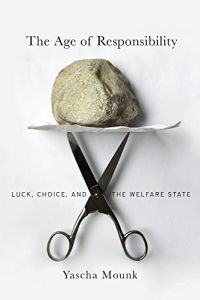Join getAbstract to access the summary!

Join getAbstract to access the summary!
Yascha Mounk
The Age of Responsibility
Luck, Choice, and the Welfare State
Harvard UP, 2017
What's inside?
Punitive welfare systems designed to encourage personal responsibility may have gone too far.
Recommendation
In the 1960s, US president Lyndon Johnson declared an all-out war on poverty, in the spirit of the then-prevailing view that helping others was a moral obligation. In the 1980s, President Ronald Reagan pivoted the notion of responsibility to mean personal accountability. In the 1990s, European and American politicians promised to “end welfare as we know it.” Society now seeks to help only those it deems deserving. But has this punitive approach to welfare gone too far? Does society focus too much on recipients’ past mistakes? Harvard lecturer Yascha Mounk’s examination of the “age of responsibility” is a challenging intellectual journey, and getAbstract recommends it to anyone interested in economics and a just society. While his academic, slightly convoluted style may cause readers to feel like struggling undergraduates sometimes, Mounk makes convincing points about the negative consequences of requiring the poor and unemployed to bear the guilt and burden of their situation. Mounk opposes the idea that government should treat people differently if they’ve caused their own plight. He issues a worthy warning against the direction the United States and other countries are taking. He reminds readers of past wisdom rather than attempting a hands-down victory by persuasion. You’ll learn a lot from his history of the philosophy of government welfare, and it lends context to the reasons society has become slightly less compassionate toward the unemployed. Mounk’s text offers a substantial counterweight to the simplistic, cure-all approaches and underfunded, clumsy bureaucracies that risk making America a harsh place to make mistakes or simply be unlucky.
Summary
About the Author
Yascha Mounk is a lecturer on political theory at Harvard University’s Government Department and a postdoctoral fellow at the German Marshall Fund’s Transatlantic Academy. He also wrote The People vs. Democracy: Why Our Freedom Is in Danger and How to Save It.

















Comment on this summary